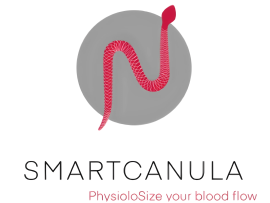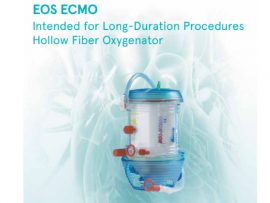[pdf-embedder url="https://perfusfind.com/wp-content/uploads/2024/05/2024-04-25_smartcanula_Selection-Chart_compressed.pdf" title="2024 04 25_smartcanula_Selection Chart_compressed"]
Lire la suiteYou can meet us and learn more about SmartCanula at these events. We are waiting for you! SECCE (National Cardiac Surgery Congress) – 2024, June 5-7 – Madrid, Spain..
Lire la suite[pdf-embedder url="https://perfusfind.com/wp-content/uploads/2024/05/2023_smartcanula_Marketing-Broschure-2023-10-30_compressed.pdf" title="2023_smartcanula_Marketing Broschure 2023 10 30_compressed"]
Lire la suiteCOURSE OBJECTIVES: Describe the main components of the ECMO circuit from venous cannula to arterial cannula & the physiology of each component. If you see an orange PRINT YOUR CERTIFICATE..
Lire la suiteMultidisciplinary Symposium Dear colleagues, It is with great enthusiasm that we invite you to participate in the 28th Brazilian Congress of Congenital Heart Diseases, Pediatric Cardiology, Intervention, and Pediatric Cardiac..
Lire la suiteWhy Simulation Matters: A Systematic Review on Medical Errors Occurring During Simulated Health Care
Abstract Background Over the past decade, the implementation of simulation education in health care has increased exponentially. Simulation-based education allows learners to practice patient care in a controlled, psychologically safe..
Lire la suiteAbstract Diabetes and hyperglycemic events in cardiac surgical patients are associated with postoperative morbidity and mortality. The causes of , the abnormal fluctuations in concentrations, in the include surgical stress, surgical techniques, medications..
Lire la suiteAbstract It is estimated that many of the complications that occur within the hospital setting are associated with surgical procedures. While some complications, such as sepsis and bleeding, are affected..
Lire la suiteAbstract Objective Several machine learning (ML) models have been used in perioperative red blood cell (RBC) transfusion risk for cardiac surgery with limited and no external validation. Hence, we sought to..
Lire la suiteAbstract In donation after circulatory death (DCD) organ transplantation, normothermic regional perfusion (NRP) restores oxygenated blood flow following cardiac arrest and reverses warm ischemia. Recently, NRP has also been used..
Lire la suiteAbstract Background: The conventional method of heparin and protamine management during cardiopulmonary bypass (CPB) is based on total body weight which fails to account for the heterogeneous response to heparin in each patient...
Lire la suiteAbstract Unfractionated heparin, administered during venoarterial extracorporeal membrane oxygenation to prevent thromboembolic events, largely depends on plasma antithrombin for its antithrombotic effects. Decreased heparin responsiveness seems frequent on extracorporeal membrane..
Lire la suiteAbstract Right heart failure (RHF) management after left ventricular assist device (LVAD) implantation includes inotropes, right ventricular mechanical support, and heart transplantation. The purpose of this study is to compare..
Lire la suiteAbstract OBJECTIVES Postoperative delirium (POD) is common, costly and associated with long-term morbidity and increased mortality. We conducted a cohort study to assess the contribution of cardiopulmonary bypass (CPB) to..
Lire la suiteAbstract Background The presence of dextran sulfate (DS) in reagents and the type of blood collection tube (citrate/citrated-theophylline-adenosine-dipyridamole [CTAD]) can lead to discrepancies between unfractionated heparin (UFH) anti-Xa levels. Objectives ..
Lire la suiteAbstract Background Healthcare systems are operating under substantial pressures, and often simply cannot provide the standard of care they aspire to within the available resources. Organisations, managers, and individual clinicians..
Lire la suiteAbstract Background: This study aimed to investigate the effects of prone position ventilation treatment on patients with acute respiratory distress syndrome (ARDS) after cardiac surgery. Methods: Clinical data were collected from 93..
Lire la suiteAbstract Background In spite of the global implementation of surgical safety checklists to improve patient safety, patients undergoing surgical procedures remain vulnerable to a high risk of potentially preventable complications..
Lire la suiteAbstract Objectives Despite significant improvement in patient blood management, cardiac surgery remains a high hemorrhagic risk procedure. Platelet transfusion is used commonly to treat thrombocytopenia-associated perioperative bleeding. Allogeneic platelet transfusion..
Lire la suiteAbstract Introduction Evidence supports the role of oxygen delivery (DO2) in ameliorating acute kidney injury (AKI). While instrumentation for continuous DO2 measurement exists, a simplified method has been reported for targeting..
Lire la suiteAbstract Iatrogenic damage to the cardiac conduction system (CCS) remains a significant risk during congenital heart surgery. Current surgical best practice involves using superficial anatomical landmarks to locate and avoid..
Lire la suiteAbstract Artificial intelligence (AI) is a transformative technology with many benefits, but also risks when applied to healthcare and cardiac surgery in particular. Surgeons must be aware of AI and..
Lire la suiteAbstract Rationale: It is unclear whether extracorporeal CO2 removal (ECCO2R) can reduce the rate of intubation or the total time on invasive mechanical ventilation (IMV) in adults experiencing an exacerbation of chronic..
Lire la suiteAbstract Background Anemia, characterized by low hemoglobin levels, is a global public health concern. Anemia is an independent factor worsening outcomes in various patient groups. Blood transfusion has been the..
Lire la suiteAbstract BACKGROUND: Cardiac surgery with cardiopulmonary bypass (CPB) is associated with hemolysis. Yet, there is no easily available and frequently measured marker to monitor this hemolysis. However, carboxyhemoglobin (CO-Hb), formed..
Lire la suiteAbstract When determining extracorporeal oxygen transfer (VMLO2) during venovenous extracorporeal membrane oxygenation (VV ECMO) dissolved oxygen is often considered to play a subordinate role due to its poor solubility in..
Lire la suiteAbstract Objective Professional standards recommend stopping cardiotomy suction at the termination of cardiopulmonary bypass before protamine administration based on perceived safety concerns. This study evaluated a multidisciplinary collaborative quality-improvement intervention..
Lire la suiteAbstract The utilization of temporary mechanical circulatory support (tMCS) has increased significantly over the last 40 years for stabilization of salvageable patients; however, there has not been much improvement in..
Lire la suiteSMART CONCEPT Smartcanula in Heart Surgery: Superior Blood Flow and Minimized Trauma! Discover our smartcanula, designed to improve cardiac surgery outcomes. Achieve superior blood flow with a smaller access..
Lire la suite

















